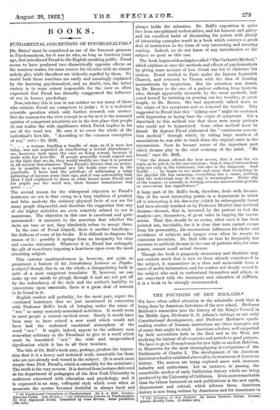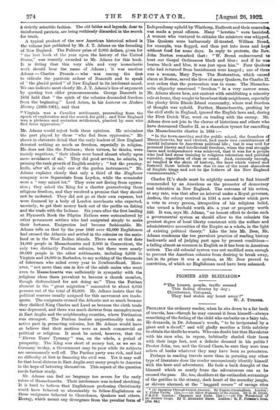THE FOUNDING OF NEW ENGLAND.*
WE have often called attention to the admirable work that is being done by American historians of the new school. Professor Baldwin's researches into the history of the King's Council in the Middle Ages, Professor G. B. Adams's writings on our early Constitutional developments, and Professor Haskins's epoch- making studies of Norman institutions are three examples out of many that might be cited. American scholars, well supported by their universities both in the East and in the West, are studying the history of all countries and periods to good purpose. We have to go to Pennsylvania for new light on ancient Babylon, to Minnesota for the most thoroughgoing investigations of the Parliaments of Charles L The development of the American historical school is exhibited above all in its treatment of American history. The sources are being explored anew with immense industry and enthusiasm. Let us instance, in passing, the remarkable studies of early Californian history which are being produced by the University of California. Even more remarkable than the labour bestowed on such publications is the new spirit, dispassionate and critical, which informs them. American history is now being written by Americans and for Americans in • The Founding of New England. By James Truelove Adams. Boston: Atlantic Monthly Press. [4 dollars net.]
strictly scientific fashion. The old fables and legends, dear to Iminformed patriots, are being ruthlessly discarded in the search for truth.
A typical product of the new American historical school is the volume just published by Mr. J. T. Adams on the founding of New England. The Pulitzer prize of 2,000 dollars, given for "the best book of the year upon the history of the United States," was recently awarded to Mr. Adams for this book. It is fitting that this very able and very iconoclastic work should bear the name of Adams ; was another Adams — Charles Francis — who was among the first to ridicule the patriotic ardour of Bancroft and to speak of "the glacial period" of New England in its intolerant mood. We can indicate most clearly Mr. J. T. Adams's line of argument
• by quoting two older pronouncements. George Bancroft in 1834 held that "the spirit of the colonies demanded freedom from the beginning." Lord Acton, in his Lectures on Modern History (1899-1901), said that
"Virginia was a Cavalier settlement, proceeding from the epoch of exploration and the search for gold ; and New England was a plebeian and sectarian settlement, planted by men who fled from oppression."
Mr. Adams would reject both these opinions. He minimizes the part played by those "who fled from oppression." He shows in elaborate detail that the early leaders of New England detested nothing so much as freedom, especially in religion.
• He does not like the Puritans ; their virtues, he thinks, were ' mainly negations, "their ideals were based almost wholly upon mere avoidance of sin." They did good service, he admits, in pruning the rank growth of English society ; "but the pruning- knife, after all, is only one of the garden instruments." Mr. .Adams explains clearly that only a third of the Mayflower company were Separatists from Leyden, while the remainder were a "very mixed lot." They were not fleeing from oppres- sion; they asked the King for a charter guaranteeing them religious freedom, and they received a promise that they should not be molested. They did not go at their own expense, but were financed by a body of London merchants who expected, unwisely, to get their money back out of the profits on fishing and the trade with the Indians. Six years after the first landing at Plymouth Rook the Pilgrim Fathers were outnumbered by other permanent settlers who had emigrated simply to make their fortunes. Emigration had become fashionable. Mn Adams tells us that by the year 1640 over 65,000 Englishmen had crossed the Atlantic and settled in the colonies on the main- land or in the West Indian islands. There were at that date 14,000 people in Massachusetts and 2,000 in Connecticut, the only two distinctly Puritan colonies, but there were nearly 50,000 people in the other settlements, including 8,000 in Virginia and 18,000 in Barbados, to say nothing of the thousands . of fishermen who sailed every year to Newfoundland. More- ' over, "not more than one in five of the adult males who went even to Massachusetts was sufficiently in sympathy with the ,religious ideas there prevalent to become a church member, though disfranchised for not doing so." Thus the Puritan element in the "great migration" amounted to about 4,000 persons out of the total of 65,000. Mr. Adams insists that the political reasons usually assigned for this movement are inade- quate. The emigrants crossed the Atlantic not so much because they disliked King Charles and Laud as because the cloth trade was depressed, and there was much distress from unemployment in East Anglia and the neighbouring counties, where Puritanism
was strongest. The Puritan leaders unquestionably took an active part in promoting colonies, but Mr. Adams would have
as believe that their motives were as much commercial as political or religious. It must be noted, however, that the "Eleven Years' Tyranny" was, on the whole, a period of prosperity. The King was short of money but, as we see in Germany to-day, a Government may be poor while its subjects are uncommonly well off. The Puritan party was rich, and had no difficulty at first in financing the civil war. Yet it may well be that local distress in East Anglia sent many people to America in the hope of bettering themselves. This aspect of the question needs further study.
Mr. Adams can find no language too severe for the early rulers of Massachusetts. Their intolerance was indeed shocking. It is hard to believe that Englishmen professing Christianity could have behaved so abominably to fellow-Englishmen as these emigrants behaved to Churchmen, Quakers and others. Heresy, which meant any divergence from the peculiar form of
Independency upheld by Winthorp, 'Endicott and their comradee, was made a penal offence. Many " heretics " were banished. A woman who ventured to criticize the ministers was whipped. The Quakers were barbarously ill-treated. William Brand, for example, was flogged, and then put into irons and kept without food for some days. In reply to protests, the Rev. John Norton remarked that : "W. Bread endeavoured to beat our Gospel Ordinances black and blue : and if he was beaten black and blue, it was just upon him." Four Quakers who had returned from banishment were hanged ; one of them was a woman, Mary Dyer. The Restoration, which caused
alarm at Boston, saved the lives of many Quakers, for Charles IL sent orders that the persecution was to cease. The Massachu- setts oligarchy construed " freedom " in a very narrow sense. Mr. Adams shows how, not content with establishing a minority rule at home, they sought to browbeat their neighbours, especially the plucky little Rhode Island community, where real freedom of thought was upheld. Further, Massachusetts, profiting by the civil strife in England, ignored the English laws and, during the First Dutch War, went on trading with the enemy. Mr.
Adams does not join in the chorus of historians and others who have denounced Charles IL as a shameless tyrant for cancelling the Massachusetts charter in 1684 :—
" In the town-meeting and the public school, the founders of Massachusetts, lay and clerical, had made two contributions of untold influence to American political life ; but it was well for personal liberty and intellectual freedom, when the real struggle came and independence was achieved, that it was for a people who had had some training in religious toleration and political equality, regardless of class or creed. And, curiously enough, so tangled is the skein of history, the laws which voiced and fostered those beliefs were due to one of the most shameless of English kings and not to the fathers of the New England commonwealth."
Charlie IL's shade must be mightily amused to find himself commended by an American as the promoter of democracy and toleration in New England. The outcome of his action,
at any rate, was that after an interval under a Royal governor, Andros, the colony received in 1691 a new charter which gave a vote to every person, irrespective of his religious belief, who owned a freehold worth 40s. a year or property worth
1.40. It was, says Mr. Adams, "an honest effort to devise such a governmental system as should allow to the colonists the greatest degree of local liberty consistent with the welfare and administrative necessities of the Empire as a whole, in the light
of existing political theory." Like the late Mr. Beer, Mr. Adams condemns the too prevalent practice of reading history
backwards and of judging past ages by present conditions—. a. failing almost as common in English as it has been in American
writers. The old colonial system was not modified soon enough to prevent the American colonies from desiring to break away, but in its prime it was a system, as Mr. Beer proved to
conviction, of which no rrigtishman need have been ashamed.



































 Previous page
Previous page